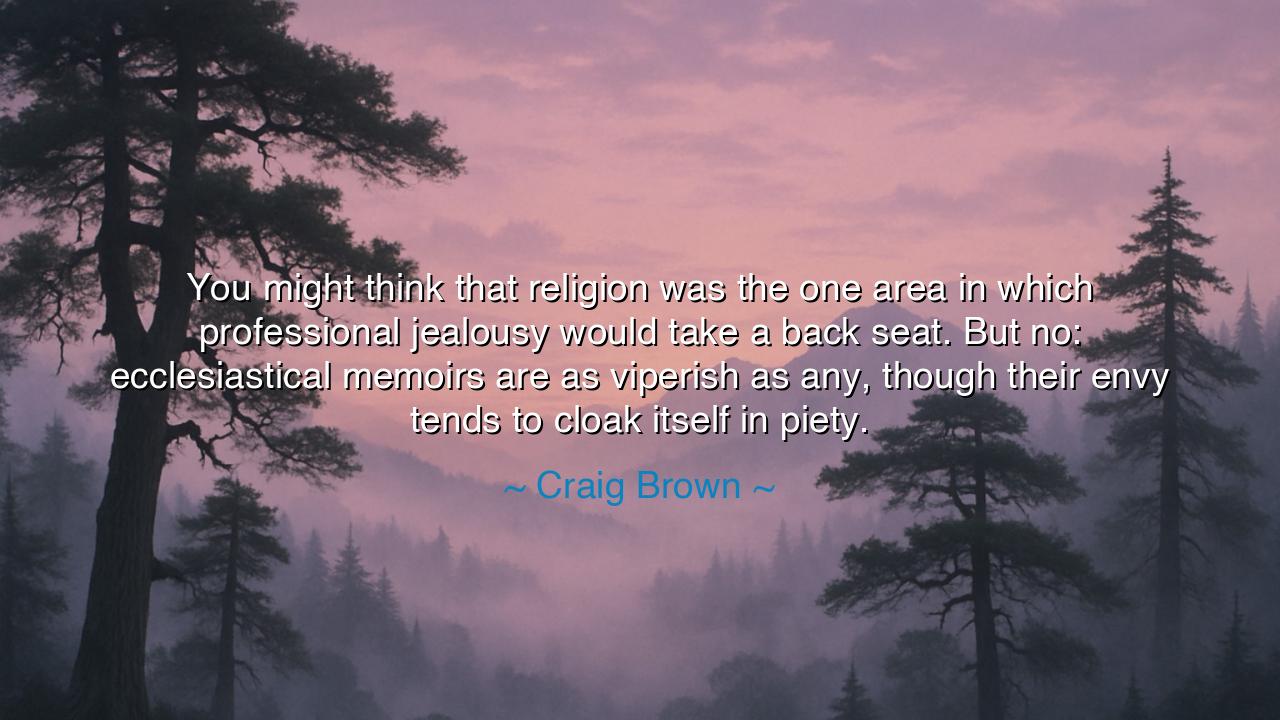
You might think that religion was the one area in which
You might think that religion was the one area in which professional jealousy would take a back seat. But no: ecclesiastical memoirs are as viperish as any, though their envy tends to cloak itself in piety.






In the words of Craig Brown, the satirist and keen observer of human vanity, we find a piercing truth when he writes: “You might think that religion was the one area in which professional jealousy would take a back seat. But no: ecclesiastical memoirs are as viperish as any, though their envy tends to cloak itself in piety.” This is not mere cynicism—it is a revelation of human frailty. Brown reminds us that even among those devoted to the divine, the serpent of jealousy slithers still. His tone is ironic, but beneath it lies a timeless lesson: that no office, however sacred, is immune to the poisons of pride and comparison.
From the earliest ages, mankind has sought holiness, yet carried into it the very flaws it sought to transcend. Craig Brown, known for his wit and insight into the hypocrisies of power, turns his gaze toward the church, not to mock faith, but to expose the truth that even in sanctity, the human heart remains vulnerable. The phrase “viperish memoirs” conjures the image of clerics writing of their rivals with hidden malice—daggers sheathed in scripture, envy cloaked in righteousness. It is a portrait of the ego that survives every robe and ritual, whispering, “I am holier than thou.”
The ancients knew this struggle well. In the Gospels themselves, the disciples of Christ quarreled over who among them was the greatest. Even those who walked beside the Teacher fell prey to ambition and envy, proving that spiritual status offers no immunity to human weakness. Later, in the Middle Ages, bishops fought over territory, monasteries competed for patronage, and reformers battled corruption while sometimes breeding it anew. The conflict between virtue and vanity was never absent, for the heart that seeks heaven must first conquer itself.
One need only remember the rivalry between Thomas Becket and King Henry II to see how jealousy and pride can hide beneath devotion. Becket, once a friend to the king, grew proud in his clerical power, and their friendship turned to fatal conflict. Henry’s envy of Becket’s influence and Becket’s pride in his holiness destroyed them both. And so Brown’s observation becomes prophetic: even under the banner of faith, jealousy finds fertile ground, for the holiest causes can be corrupted when the self demands recognition.
Yet Brown’s words are not meant to scorn faith, but to warn of hypocrisy—the most dangerous form of envy. When jealousy disguises itself as zeal, it becomes doubly destructive, for it deceives both the world and the soul. The “pious envy” he describes is not open or honest; it hides behind smiles and prayers, poisoning communion with quiet resentment. The danger lies not in the presence of envy, but in its denial. For those who pretend holiness while harboring bitterness, faith becomes performance, and worship turns hollow.
But even in this, there is hope. To recognize the viper within is the beginning of wisdom. Every heart, no matter how devout, must confront its shadow. The monks of old taught that humility—the clear seeing of oneself—is the cure for envy. To serve without comparing, to love without competing, to labor for truth without demanding praise—these are the disciplines that cleanse the soul. The truly holy man is not the one without jealousy, but the one who has tamed it through honesty and self-knowledge.
Thus, the lesson of Craig Brown’s irony is as ancient as it is modern: beware the pride that wears the mask of virtue. Whether in the pulpit or the marketplace, jealousy remains the same serpent, coiling through human ambition and whispering vanity into sacred ears. To guard against it, one must practice the hardest art of all—to rejoice in another’s light, to bless the success that is not one’s own.
For in the end, even the holiest robes cannot hide the human heart. It is not piety that proves purity, but humility. And when envy is confessed rather than cloaked, when rivalry yields to reverence, then the sacred truly becomes sacred—not because it is perfect, but because it is honest.






AAdministratorAdministrator
Welcome, honored guests. Please leave a comment, we will respond soon